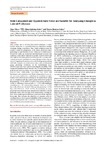Mostrar o rexistro simple do ítem
Both Unopposed and Opposed Judo Tasks are Suitable for Analyzing Changes in Lateral Preference
| dc.contributor.author | Mayo, Xián | |
| dc.contributor.author | Iglesias-Soler, Eliseo | |
| dc.contributor.author | Dopico-Calvo, Xurxo | |
| dc.date.accessioned | 2019-09-16T17:39:57Z | |
| dc.date.available | 2019-09-16T17:39:57Z | |
| dc.date.issued | 2019-06 | |
| dc.identifier.issn | 1303-2968 | |
| dc.identifier.uri | http://hdl.handle.net/2183/23948 | |
| dc.description.abstract | [Abstract] Judo coaches aim to develop left-handed techniques in righthanded judoka due to a potential frequency-dependent strategic advantage during competition. Thus, easily completed tasks are needed to track the progression of the lateral preference index (percentage as right-handed actions). Thirty naïve volunteers performed two tasks, an unopposed repetition-based dynamic task (yakusoku geiko) and an opposed-bouts task (randori), before and after eight-week training protocols differing in the executing side. Training protocols consisted of a control group (without any instruction regarding the practice side), a bilateral group (practicing with both dominant and nondominant sides), and a nondominant group (practicing exclusively on the nondominant side). ANOVA-type tests were used for analyzing the suitability of the unopposed repetition-based dynamic task for detecting changes in the lateral preference index and for analyzing the concordance between tasks. Additionally, concordance was tested with Spearman's rank correlations and Bland-Altman plots. Lower lateral preference indices (i.e., reductions of executions as righthander) were observed after training in the nondominant group and in comparison with the control group and bilateral group on the posttest (p < 0.05). ANOVA-test for concordance analysis revealed no differences between tasks (p > 0.05) with significant correlations (p < .05) and low bias during the pretest (ρ = 0.563; bias: 4.29, 95% LoA: -36.32-27.74%) and the posttest (ρ = 0.718, bias: 0.69, 95% LoA: -39.37-40.77%). In conclusion, an unopposed repetition-based dynamic task detected reductions in lateral preference index after an eight-week nondominant training period. These results agreed with those observed with the opposedbouts task. This indicates the eligibility of yakusoku geiko for coaching delivery due to general suitability of the unopposed repetition-based dynamic task to track the maintenance or progression of left-handedness in judo trainees. | es_ES |
| dc.language.iso | eng | es_ES |
| dc.publisher | Journal sports science & medicine | es_ES |
| dc.relation.uri | ©Journal of Sports Science and Medicine | |
| dc.subject | Laterality | es_ES |
| dc.subject | Judo | es_ES |
| dc.subject | Motor learning | es_ES |
| dc.subject | Skills acquisition | es_ES |
| dc.subject | Lateralidad | es_ES |
| dc.subject | Aprendizaje motor | es_ES |
| dc.subject | Adquisición de habilidades | es_ES |
| dc.title | Both Unopposed and Opposed Judo Tasks are Suitable for Analyzing Changes in Lateral Preference | es_ES |
| dc.type | info:eu-repo/semantics/article | es_ES |
| dc.rights.access | info:eu-repo/semantics/openAccess | es_ES |
| UDC.journalTitle | Journal of sports science and medicine | es_ES |
| UDC.volume | 18 | es_ES |
| UDC.issue | 2 | es_ES |
| UDC.startPage | 295 | es_ES |
| UDC.endPage | 300 | es_ES |
Ficheiros no ítem
Este ítem aparece na(s) seguinte(s) colección(s)
-
GI-PHG - Artigos [112]






